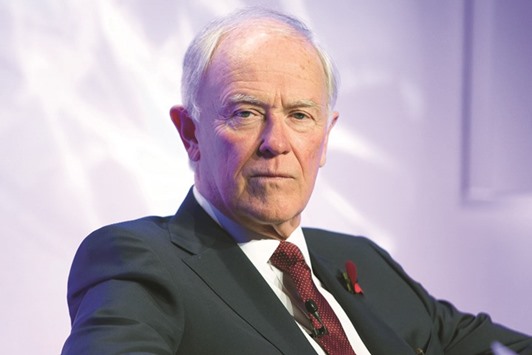Emirates president Tim Clark said he’s bracing for a “gathering storm” as low-cost airlines encroach on the inter-continental routes around which the biggest long-haul carrier has built its business.
Dubai-based Emirates sees threats across all markets from rivals spanning Norwegian Air Shuttle to the Scoot unit of Singapore Airlines, Clark said yesterday in Berlin. The Gulf company may also need to establish a short-haul fleet as Mideast nations which it has struggled to serve begin to open up. That the decision will be one for his successor, the executive said.
“The dynamic is changing in the Middle East with regard to access to new markets,” Clark said in Berlin, where travel industry executives have are gathered for the ITB tourism fair. “Our business model was set in the late 1980s, when access was denied to us by many places in the region.”
Clark, who has run Emirates since 2003, said that while he sees no immediate switch away from an all-wide-body fleet, “others coming behind may take a different view.” The 67-year-old said it would be “remiss” of him to commit to a particular plan and that “business doesn’t stop when I go,” giving the strongest hint yet that his time in charge may be drawing to a close.
Emirates has established itself as the world’s biggest carrier serving international routes by transforming Dubai into a transfer hub for flights between the Americas and Europe and the Asia-Pacific, Middle East and Africa.
While Norwegian Air has focused its long-haul efforts chiefly on trans-Atlantic flights, it also has a hub in Bangkok, while Scoot plans to begin flights to Europe this summer starting with a service to Athens – a city that’s also part of the Emirates network – in June.
“At the back end of ’90s I did a paper on long-haul low-cost,” Clark said. “Everyone laughed at me, but what I predicted then has finally started to happen. We have players in all arenas – Europe, America, Asia. It’s a gathering storm.”
The executive said that the situation is being complicated by the response of established network carriers such as British Airways owner IAG SA, which plans to start lower-cost flights using Airbus A330 wide-body jets, initially out of Barcelona, and Deutsche Lufthansa’s Eurowings arm, which is expanding as fast in long-haul routes as it is on intra-European services.
After a “few years of instability,” increasing demand for inter-continental services should be sufficient to support much of the expansion “as the pie grows,” Clark said. Low-cost carriers specialising in short-haul routes are also likely to play a bigger role in linking up with long-haul operators, he said. Ryanair Holdings already plans to provide feeder traffic to Norwegian, and has indicated that it might be open to connecting with Gulf operators.
Political and socio-economic upheavals have created an environment in which running a global airline has become increasingly challenging, Clark said. While a decade ago a major carrier might have faced disruptive events a couple of times a year, “the pace of change is accelerating and quite destabilising.”
President Donald Trump’s overnight ban on travel by people from seven mainly Muslim nations to the US led to an unprecedented 35% decline in the pace of bookings, Clark said, with demand remaining lower.

Dubai-based Emirates sees threats across all markets from rivals spanning Norwegian Air Shuttle to the Scoot unit of Singapore Airlines, says its president Tim Clark.
